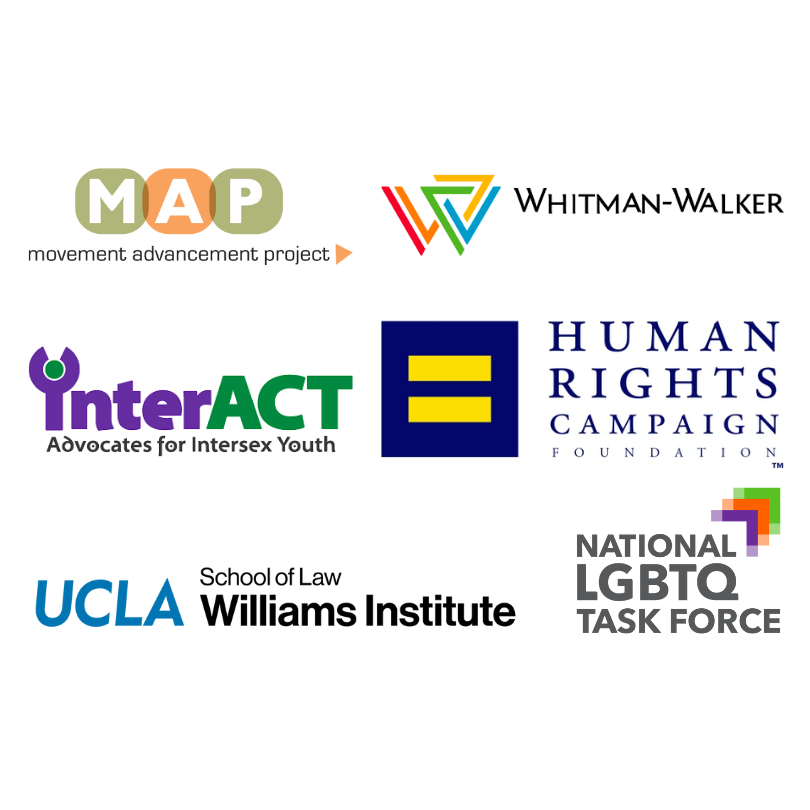MEDIA CONTACT:
Rebecca Farmer, Movement Advancement Project
rebecca@mapresearch.org | 303-578-4600 ext 122
January 30, 2023
This month the White House released two reports required by the June 2022 Executive Order 14075 on Advancing Equality for Lesbian, Gay, Bisexual, Transgender, Queer, and Intersex (LGBTQI+) Individuals: the Federal Evidence Agenda on LGBTQI+ Equity from the Office of Science and Technology Policy and Recommendations on the Best Practices for the Collection of Sexual Orientation and Gender Identity Data on Federal Statistical Surveys from the Office of Management and Budget. As organizations working to address the serious social, economic, and health disparities facing LGBTQI+ communities, we welcome these reports as a critical foundation for a whole-of-government commitment to data equity and evidence-based policymaking that advances the well-being of LGBTQI+ people and their families.
In many respects, the reports released this month represent a milestone in improving federal data collection for LGBTQI+ equity, and we applaud the Administration taking these crucial steps to implement Executive Order 14075. Like the comprehensive 2022 study from the National Academies of Sciences, Engineering, and Medicine that recommended specific principles and measures for collecting data on sexual orientation, gender identity, and sex characteristics (SOGISC), these reports emphasize that these data elements are demographic measures similar to race and ethnicity and that, especially in the context of federal surveys, methods for collecting these data already exist and can be readily deployed. The new reports highlight that the federal statistical system should begin collecting these data immediately, while continuing to invest in ongoing research and refinement.
While we celebrate this progress on data equity for LGBTQI+ communities, we are also disappointed: both reports represent missed opportunities to elevate intersex-inclusive data collection as an equal priority. Intersex-inclusive data collection is both feasible and badly needed, especially as intersex people, like other sexual and gender minorities, face increasing threats to their well-being from state-sponsored discrimination across the United States. Accordingly, Executive Order 14075 requires a fully intersex-inclusive approach to data collection efforts, and we are hopeful that the federal agencies will follow the recommendations laid out in the 2022 National Academies report for immediately testing and fielding intersex status measures alongside other demographic variables.
As these reports reflect, most federally supported surveys and other data systems do not yet collect SOGISC data and thus provide little or no information about the well-being of LGBTQI+ people and the characteristics of LGBTQI+ populations. The few surveys and other instruments that do already collect some sexual orientation and gender identity data have significant gaps, and no nationally representative surveys collect data about variations in sex characteristics or intersex people. Without these data, federal, state, local, and tribal governments are limited in their ability to understand and meet the needs of diverse LGBTQI+ communities struggling with poverty, homelessness, discrimination, violence, and other disparities in health and well-being.
The next step in implementing these reports is for the federal agencies to develop SOGISC Data Action Plans detailing how they will enhance data collection to assess and improve the well-being of LGBTQI+ populations over time. We strongly urge the White House and the federal agencies to take the following actions to continue to effectively advance SOGISC data collection and LGBTQI+ equity:
In their SOGISC Data Action Plans, the federal agencies should identify surveys and other data collections where measures on sexual orientation, gender identity, and sex characteristics can immediately be added. Where further evaluation of new or improved measures is needed, agencies should undertake that work expeditiously and should coordinate to learn from one another’s efforts.
The White House should build on these reports by incorporating an emphasis on SOGISC data collection and equity for LGBTQI+ populations as a routine part of information collection reviews and by developing additional, formal directives to guide agencies into the future, such as an OMB Memorandum or Statistical Policy Directive on collecting SOGISC data.
Congress should increase funding levels across the federal statistical system and should provide dedicated funding for continual improvement of SOGISC data collection and research, in alignment with the requirements of Executive Order 14075.
We urge leaders across the Biden-Harris Administration to take swift action to add SOGISC measures to critical surveys and other data collection systems, while fully adhering to the President’s directive in Executive Order 14075 that data collection efforts be intersex-inclusive. We look forward to working with our federal partners—along with other public and private partners across health care, education, and other sectors—to ensure that LGBTQI+ people are counted and that these data are used to advance equity and opportunity for all.
###
MAP's mission is to provide independent and rigorous research, insight and communications that help speed equality and opportunity for all. MAP works to ensure that all people have a fair chance to pursue health and happiness, earn a living, take care of the ones they love, be safe in their communities, and participate in civic life.


